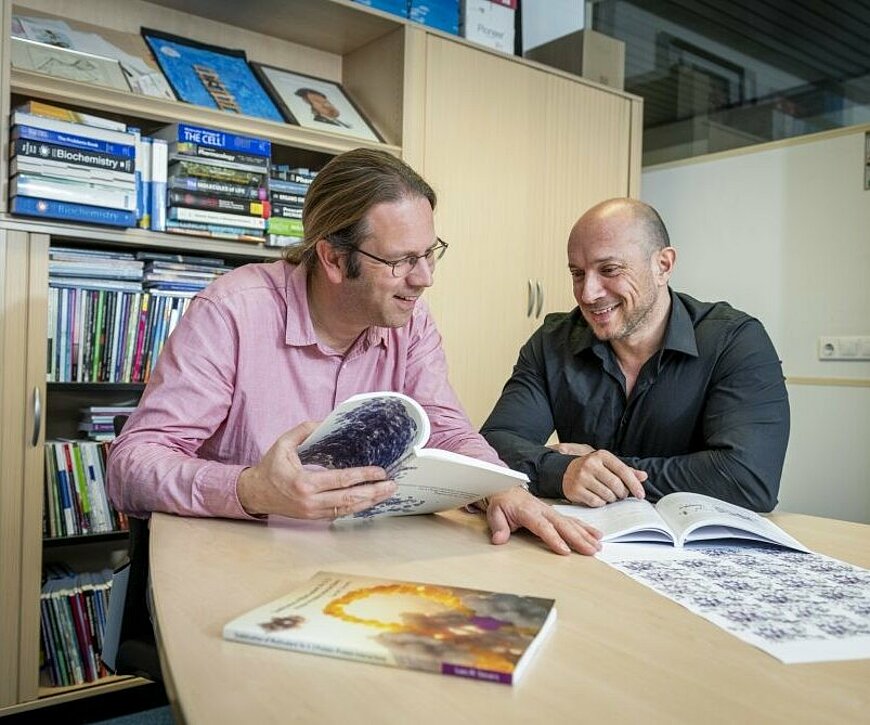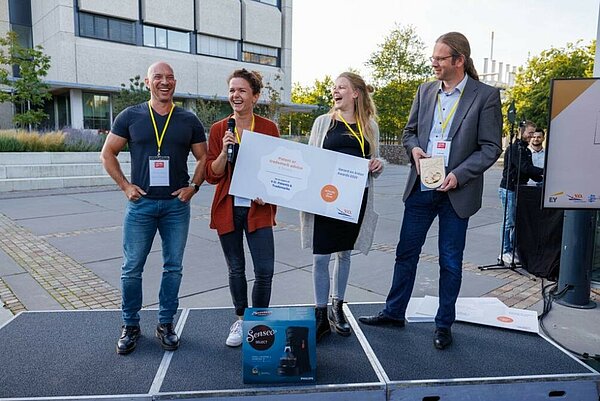Hard-to-treat cancers becoming treatable thanks to Ambagon Therapeutics

The winners of the Gerard and Anton Awards are highlighted. Today: Ambagon Therapeutics.
Pathogenic proteins play a role in causing a range of diseases. Biotech company Ambagon Therapeutics, a spin-off from Eindhoven University of Technology (TU/e) in the Netherlands, is developing new treatment therapies based on proteins that are instrumental in treating cancer and other diseases. In this instalment of start-up of the day, founders Luc Brunsveld and Christian Ottmann talk about how their company is faring.
How does it work?
The Dutch-American company is developing medication that will help treat cancer more effectively in the future. Specifically, Ambagon is focusing on molecules that enable ‘good’ proteins to access pathogenic proteins, i.e., a ‘molecular glue.’ By establishing this connection between good and bad proteins, tumor growth stagnates in certain cancers.
How is Ambagon faring at the moment?
Christian: “Things are going well for us. We are busy developing our molecules in our preclinical studies where we test the molecule on human cells, and so far it’s looking very promising. We are starting to see the effects that we want. If this continues, then we can start taking the next steps and partnering with pharmaceutical companies. We were founded in 2020 and are expanding rapidly. At present, our team already counts 42 employees.”

What types of cancer are you focusing on?
Christian: ” Right now, we are working on protein combinations that can be used in different cancer treatments. Take Acute myeloid leukemia (AML) for example: blood and bone marrow cancer, or lung cancer. These are types of cancer that are currently difficult to treat. But in the future we will also do research on the effectiveness of our therapies in the treatment of Alzheimer’s or Parkinson’s, for example."
"The great thing is that we can use our molecules in a very wide range of applications.”
Is the pharmaceutical sector open to your solution?
Luc: “The pharmaceutical sector is, in my opinion, one of the most innovative sectors in the world. Concepts are regularly put forward here that are extremely innovative. If you have a sound idea and come up with a good plan to go with it, then the sector is willing to embrace innovative solutions like ours.”
What challenges have you run into in recent years?
Christian: “We are working on an innovative new medication, so everything we do, we are doing for the first time. That’s great, obviously, but it can also be challenging. It is a huge task to get to grips with the biological system. After all, the human body is complex, and so you also see that a large percentage of potential medications flounder during development. When you develop an app, for instance, you can predict relatively accurately how it will work. It’s a completely different story for us.”
Luc: ” Apart from that, starting a company is in itself a great learning experience. We have learned an awful lot of new things, from opening a bank account for an international company to building a network.”
What are you most proud of so far?
Christian: ” We have won several competitions. For example, one of our milestones was securing 75 million euros in a funding round in January. I’m proud that we managed to get several investors on board.”
Where will Ambagon be in five year’s time?
Luc: “Our goal is not to develop a single, specific medication, but ultimately to create an entire platform. Then from that, we will continue to develop different types of medicines. Hopefully within five years, we will have several clinical studies and projects underway in the field of oncology. Maybe even beyond that by then. This is how we are going to bring about a protein-based drug revolution.”
Read more about Ambagon Therapeutics
